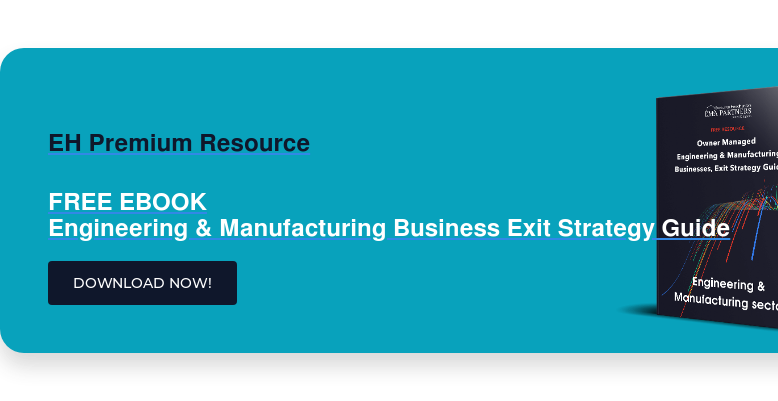If you are a business owner who is considering retiring or leaving your business, you’ll want to start to think about business exit strategy planning. A business exit strategy is an action plan that will help develop and smoothen the process of lowering your involvement of your company, sometimes in order for someone else to take over.
Often one of the first steps people take in beginning this process is looking for a suitable individual to recruit as their successor or replacement. But what is the best way of searching for, identifying, and recruiting the perfect person for you and your business?
This article will outline what steps you as a business owner can take to recruit the ideal candidate that will assist in developing your business exit planning strategies.
Analyse Your Business Structure and Culture

Before you start thinking about the type of candidate you want and need to make your business exit strategy a success, it can be useful to first consider the culture of an organisation.
This includes features of your company such as size, hierarchy, ethos, environment, working culture etc. These factors have a considerable effect on your hiring process and desired result. It’s important to understand before the hiring process starts exactly what kind of candidate would thrive in the position you’re offering, otherwise you risk hiring someone who on paper sounds right for the job, but ends up not being the right fit for your business’ structure or working environment.
Identifying Need
To start with, it’s a good idea to begin to identify what role your candidate will take. For example, whether you’re looking for someone to take over in the same or a similar role, for an individual who could assist in the selling and handover of your business, or someone who can advise you on best practice and guide you through your exit if you’re unsure about what direction to take. The chances are you might need to recruit a team of professionals in order to fully structure and implement yourbusiness exit strategy.
There are a multitude of roles which you could recruit for that could help you construct, develop, and implement your business exit strategy. The most obvious example is that you might want to hire a replacement or successor in your role, however what about individuals who can assist in the formation of your exit plan? For example these may be personal advisors who can form an advisory board which can then help you determine what your best options are. You may also look at hiring financial advisors who can assist you in understanding and resolving any tax implications and help you avoid losing any money unnecessarily.
Once you’ve identified what type and capacity of individuals you need, you can then move on to the specifics; what exactly you want from them, what qualities, experience, and background they need to have.
Features of Perfect Candidate (experience, skills, knowledge, industry, reputation)
The next step is to identify what specific features, qualifications, experience, and skills are required of your candidate in order to be suitable for the position. Regardless of what role your candidate will be taking on, being directly involved with a business exit strategy is a very important responsibility, and therefore you’ll want to take on only the most talented, reliable people.
Take into account what industry or sector you want to target in your search, as well as any specific skills and experience the candidate needs (for example strong experience and expertise in selling or transferring businesses and assets). Also consider the reputation of your candidate, for example if you’re looking for a new Managing Director to run your company, you’ll of course want candidates to have a good reputation and strong experience running businesses similar to yours, including a good knowledge of the industry and your business.
Think about what personality your perfect candidate should have, taking into account the business culture / structure you have outlined. It’s important to give consideration to this as even if a candidate possesses all the right skills and experience, if they don’t fit with your company culture then they may struggle with workplace engagment and running your business to its full potential.
Management Team

Not only do you need to ensure that you find a suitable replacement for yourself, you also need to make sure that the entire management team in place at your business is strong, reliable, and capable of remaining stable in your absence. Consider the possibility that some members of management may want to follow suit and exit the business alongside you. This situation may occur if current team members are concerned about the potential impact of you leaving the business.
By ensuring that you remain transparent and confident about your replacement and about the future direction of your business, you can lower the chances of other members of management wanting to move on, which could make your exit more troublesome.
Should senior employees or members of management decide to exit the business as well, you should also consider conducting additional recruitment for their replacements. Keep in mind, though, that a strong management team is necessary to maintain continuity of earnings, and that many potential buyers will only be interested if they are assured that the current management will remain.
This is less of an issue if your exit strategy involves a management buy-out, as this strategy not only allows you to pass your business on to a reliable party with knowledge of the company, but also saves you the effort of having to recruit a new management team.
If you feel that you will need to recruit a group of individuals, for example bring in a new management team or division, some executive search agencies can do this as one project. Team Acquisition is one of the Services we offer here at Executive Headhunters EMA Partners.
Using our skills and experience, we can help you to recruit entire teams of high-level individuals for your business.
Thinking About Your Exit Strategy Business Plan
Once you’ve thought about what you need, you need to decide how you want to go about recruiting your ideal candidate. There are a few options available to you at this point, but the right option for you depends entirely on your business model and what exactly you are looking for. Here we will outline some of the internal and external recruitment methods that you can utilise to find the best candidate possible for the job.
Internal Recruitment
When thinking about appointing a successor as part of your Exit Strategy Business Plan, you’ve probably considered the option of internal recruitment. This is often people’s first thought when hiring for a role, especially when looking for a replacement. If you’re looking for an individual who can replace you in your current position, the most obvious option would be to look internally within your own company. This is especially common in family-run businesses.
This is often referred to as ‘succession planning’, which specifically focuses on building up your business’ talent pipeline in order to train certain senior members of staff the skills necessary to take over in your role. Your internal talent pipeline is your lineup of employees who are being trained and nurtured in order to make them suitable for advancement to more senior roles. This can often be achieved through executive training in order to provide them with the necessary knowledge, skills, and experience that will allow them to improve their work and ultimately make them a viable candidate for your succession planning.
Start by identifying senior members of staff who you feel may have the potential to take over in this role. Another option is to ask around and identify suitable individuals that any of your senior staff recommend. The option of internal recruiting can be very useful for several reasons.
One large benefit is that it is generally the quickest and cheapest recruitment option available, though the exact cost and time taken relies largely on the quality of your internal talent pipeline. Perhaps the main benefit of internal recruiting, though, is the fact that candidates sourced from your own company already have good knowledge of your business and the role.
This makes evaluating whether they would be a good fit or not much easier than when dealing with new candidates.
Networking and Referrals

Oftentimes some of the best candidates for your role can come from those within your company. Your members of senior management should have strong networks of connections, and may know people who are suitable for the role. This allows you to get more personal candidate recommendations from individuals who understand you, your business, and its needs, as well as understanding the candidate better.
It’s also very useful to have a strong talent pipeline in situations such as this. What this means is keeping your employees trained and ready to advance their careers in your business. By recruiting for senior roles through promotions within your own company, you can save a great deal of time and money as well as promote employee development and progression within your company, and improve company morale as a result.
External Recruitment
Perhaps the most effective and method of sourcing the right candidate with the highest quality results is through external recruitment. There are a few different options available to you when considering external recruitment, the most popular of which are in-house recruitment, contingency recruitment firms, and headhunting firms.
We’ve provided an outline of these options here, to help you form an idea of what might be the right option for you.
In-House
Utilising an in-house recruitment team is often the cheapest of these three options. However, this method is heavily reliant on the experience, skills, and resources of your recruitment team. For example, it’s generally the case that in-house recruitment teams will have less overall experience and sector knowledge than a recruitment or headhunting agency. However, they do tend to have more specific company knowledge and a deeper understanding of the role, staff training ideas, business environment, and the type of person that would excel in the position.
Before deciding upon whether you will take this option, consider what recruitment your in-house team has conducted before, for what level of seniority, and how successful this previous recruitment was.
If your recruitment team don’t have a strong track record of hiring for similar positions, by relying solely on this team without professional external assistance you could be risking hiring the wrong candidate.
Contingency Recruiters
The next option that you have at your disposal is non-retained recruitment agencies. These agencies will search for candidates that are suited to the role you want to fill, and deliver you a shortlist of what they believe to be the best candidates. This option is more costly than in-house recruitment, but in turn has some advantages. Quality recruiters usually have an expansive network in which to source candidates, which often far surpasses that of an in-house recruitment team.
In addition, they have the right skills and experience that allows them to source the most relevant candidates in a timely manner. As they are non-retained, this means that you are free to conduct other methods of recruitment for the same role at the same time, however as recruiters get paid on successful hires only, they are competing with each other, and likely won’t be fully committed to finding the right person for you if you are actively using other agencies. Recruiters are usually generalist meaning they have a broad knowledge of various sectors and will recruit for positions of any level. However, contingency recruiters are usually used for less senior roles, as their recruitment process is less focused on detail and quality, and more on speed of delivery, as they generally only receive payment on candidate placement.
Retained Headhunters

Retained headhunters are the next option up from non-retained recruiters, and generally speaking the most thorough but most costly option of the three listed here. These executive search firms operate in a similar manner to contingency recruiters, but the main differences are that they generally are more in depth and are retained. This means that by using headhunters such as this, you are agreeing to not go through other recruiters or agencies for the same role. In return, this means that you receive a very thorough and detailed search that most recruitment options don’t provide.
The retained service also means that the pricing structure varies from traditional recruiters. Whilst most high-street recruiters charge one fee upon candidate placement only, retained headhunters usually split the charge into parts. These fees are to ensure that the process remains exclusive to that particular headhunter. The fees are also in place as the level of initial research that goes into each headhunt is so high, headhunters invest a lot of time and effort into each project before the talent search even fully begins.
Many retained headhunters also have a replacement guarantee in place meaning that they will provide a replacement should the hired candidate leave within a certain amount of time.
This is to guarantee that the candidate they find is the best match for your company long term, not just anyone that fits the role.
Like recruiters, headhunters can be both specialist and generalist. The obvious benefit of specialist headhunters is that they have an extremely in-depth knowledge of their sector, with the downside being that they have less experience recruiting from outside of their specialist industry. In comparison, generalist or ‘whole of market’ headhunters have a much broader knowledge of various sectors, whilst usually having less experienced knowledge of a specific sector, and they are able to source high-quality talent from multiple industries to collect a more varied yet targeted shortlist. They also generally have less bias or reliance on reusing candidates and headhunting from the same sources that can sometimes occur with specialist recruiters.
Perhaps the main benefit of headhunting agencies is their ability to find highly-talented individuals who aren’t looking for new opportunities, and nurture them to your opportunity and business. This is extremely important especially with very high-level senior roles such as Directors as often the very best talent are comfortable in their current role and need to be familiarised with your business and opportunity before they can be nurtured towards it.
Making the Right Decision for You and Your Business
Ultimately, the right recruitment option for you and your business depends entirely on your company structure and staff. It can be useful to consider your senior staff talent pipeline as well as the capabilities and experience of your hiring team when considering internal and in-house recruitment options, and consider how much you are willing to spend in comparison to the quality of service you want to receive when looking at hiring a recruitment or headhunting agency.
When making your final decision regarding you’re the recruitment stage of your business exit strategy planning, it’s good to know exactly what you need, and what you have available. Don’t neglect to take your time considering this decision.
Business Exit Planning & Recruiting Your Ideal Candidate
One of the most crucial stages of business exit planning is deciding who you need to recruit and how you need to recruit them.
When deciding what type of people you need to recruit, you should take a good look at your business, assess your current culture, structure, and management, then think about what you need to form watertight business exit planning strategies.
As we outlined, there are a few different options to choose from for your recruitment needs, however if you’re willing to spend the money, retained headhunters and executive search firms are almost always the most reliable method of recruiting top-level talent for your business, whether this would be an owner to replace yourself, or a whole team to assist in your business exit planning.


